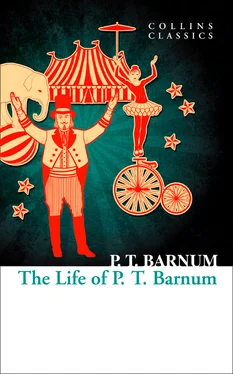“Mother, open the door and let the gentleman pass out; he is undoubtedly crazy,” said Miss Mary.
“By thunder! I believe I shall be if I remain here long,” exclaimed the hatter, considerably excited. “I wonder if folks never do business in these parts, that you think a man is crazy if he attempts such a thing?”
“Business! poor man,” said Mary soothingly, approaching the door.
“I am not a poor man, madam,” replied the hatter. “My name is Walter Dibble; I carry on hatting extensively in Danbury; I came to Grassy Plains to buy fur, and have purchased some ‘beaver’ and ‘coney,’ and now it seems I am to be called ‘crazy’ and a ‘poor man,’ because I want to buy a little ‘Russia’ to make up my assortment.”
The ladies began to open their eyes a little. They saw that Mr. Dibble was quite in earnest, and his explanation threw considerable light upon the subject.
“Who sent you here?” asked sister Mary.
“The clerk at the store opposite,” was the reply.
“He is a wicked young fellow for making all this trouble,” said the old lady. “He has been doing this for a joke,” she continued.
“A joke!” exclaimed Dibble, in surprise. “Have you not got any Russia, then?” he asked.
“My name is Jerusha, and so is my daughter’s,” said Mrs. Wheeler, “and that, I suppose, is what he meant by telling you about old and young Rushia.”
Mr. Dibble bolted through the door without a word of explanation, and made directly for our store. “You young scamp!” said he, as he entered; “what did you mean by sending me over there to buy Russia?”
“I did not send you to buy Rushia. I supposed you were either a bachelor or widower, and wanted to marry Rushia,” I replied, with a serious countenance.
“You lie, you young dog, and you know it,” he replied; “but never mind, I’ll pay you off for that, some day;” and taking his furs, he departed with less ill-humor than could have been expected under the circumstances.
“As drunk as a hatter” has long since passed into a proverb. There were some sober hatters in the times of which I write, but there were also many drinking ones. The hatters from out of town bought their rum by the keg or barrel, while those on Grassy Plains kept a man whose almost sole duty it was to go to and from the store and shops with half a dozen rum-bottles of various sizes. Some of these bottles were replenished several times in a day. My business, of course, included the filling of rum-bottles. I suppose I have drawn and bottled more rum than would be necessary to float a ship.
As it required a man of no superior intelligence to be a liquor carrier, the personage filling that office was usually a half-witted sort of fellow, or sometimes a broken-down toper, whose honor could be relied on not to drink until he had arrived at the hat shops with his precious burdens. The man who carried the bottles from the local hat shops the season I lived there was nicknamed “Soft Case.” He did not resent this title, when used by the journeymen and other men, but would not permit the boys to make use of the epithet. He was a harmless sort of chap, usually about half drunk, with just about brains enough to fill the station to which he was appointed. His name was Jacob, and by this name I usually addressed him; but coming in one day while I was in a hurry, I called out, “Well, Soft Case, what kind of liquor do you want today?”
“Don’t call me Soft Case,” said he, indignantly; “I’ll not allow it. I want you to understand, sir, that I am as hard a case as you or anybody else.”
Among our customers were several old Revolutionary pensioners, who usually traded out the amounts of their pensions before they were due, leaving their pension papers with us as security. It was necessary for us, however, in order to obtain the pension money, that the pensioner should appear before the pension agent when his money was due, and sign a receipt therefor. As some of these old men were pretty hard drinkers, it behooved us not to suffer them to trade out all their pension long before it was due, as instances had been known where they had refused to appear and sign their names unless their creditor would present them with a handsome bonus.
The name of one of our pensioners was Bevans. His nickname was “Uncle Bibbins.” He loved his glass, and was excessively fond of relating apocryphal Revolutionary adventures. We could hardly name a battle which he had not been in, a fortress which he had not helped to storm, nor any remarkable sight which he had not seen.
“Uncle Bibbins” had nearly used up his pension in trade at our store. We held his papers, but three months were to elapse before he could draw his money. We desired to devise some plan to get him away for that length of time. He had relations in Guilford, and we hinted to him that it would be pleasant for him to spend a few months with his Guilford friends, but he did not seem inclined to go. I finally hit upon an expedient that I thought would effect our design.
A journeyman hatter, named Benton, worked for my uncle Nichols. He was fond of a joke. I induced him to call “Uncle Bibbins” a coward, tell him he had been wounded in the back, etc., and thus provoke a duel. He did so, and at my suggestion “Uncle Bibbins” challenged Benton to fight him with musket and ball at a distance of twenty yards.
The challenge was accepted, I was chosen second by “Uncle Bibbins,” and the duel was to come off immediately. My principal, taking me aside, begged me to put nothing in the guns but blank cartridges. I assured him it should be so, and therefore that he might feel perfectly safe. This gave the old man extra courage, and caused him to brag tremendously. He declared that he had not been so long in bloody battles for nothing, and that he would put a bullet through Benton’s heart at the first shot.
The ground was measured in the lot at the rear of our store, and the principals and seconds took their places. At the word given both parties fired. “Uncle Bibbins,” of course, escaped unhurt, but Benton leaped several feet into the air, and fell upon the ground with a dreadful yell, as if he had been really shot. “Uncle Bibbins” was frightened. As his second I ran to him, told him that in my hurry to take the ball from Benton’s gun, I had by some mistake neglected to extract the bullet from his , and that he had undoubtedly killed his adversary. I then whispered to him to go immediately to Guilford, to keep quiet, and he should hear from me as soon as it would be safe to do so. He started up the street on a run, and immediately quit the town for Guilford, where he kept himself quiet until it was time for him to return and sign his papers. I then wrote him that “he could return in safety, that almost miraculously his adversary had recovered from his wound, and now forgave him all, as he felt himself much to blame for having in the first place insulted a man of his known courage.”
“Uncle Bibbins” returned, signed the papers, and we obtained the pension money. A few days thereafter he met Benton.
“My brave old friend,” said Benton, “I forgive you my terrible wound and long confinement on the very brink of the grave, and I beg of you to forgive me also. I insulted you without a cause.”
“I forgive you freely,” said “Uncle Bibbins;” “but,” he continued, “you must be careful next time how you insult a dead shot.”
Benton promised to be more circumspect in future, and “Uncle Bibbins” supposed to the day of his death that the duel, wound, blood and all, was a plain matter of fact.
Perhaps I should apologize for devoting so much space, as I have done in the foregoing pages, to practical jokes and other incidents not immediately relating to myself. I was born and reared in an atmosphere of merriment; my natural bias was developed and strengthened by the associations of my youth; and I feel myself entitled to record the sayings and doings of the wags and eccentricities of Bethel, because they partly explain the causes which have made me what I am.
Читать дальше












